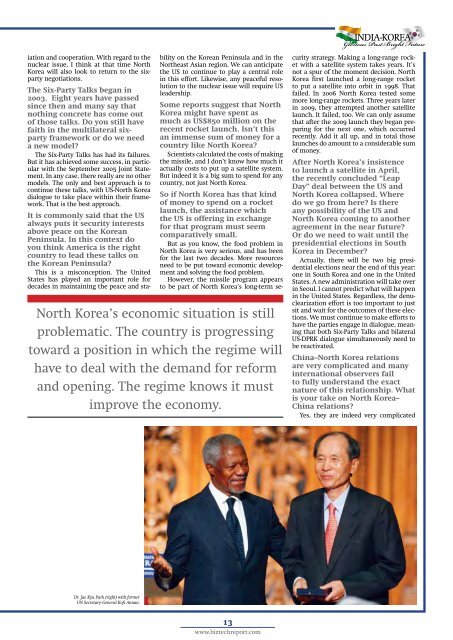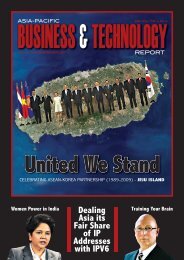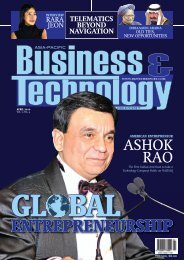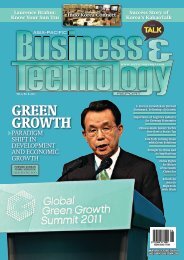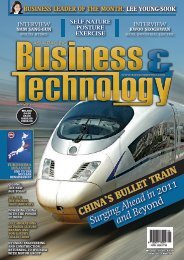INDIA-KOREA - Asia-Pacific Business and Technology Report
INDIA-KOREA - Asia-Pacific Business and Technology Report
INDIA-KOREA - Asia-Pacific Business and Technology Report
You also want an ePaper? Increase the reach of your titles
YUMPU automatically turns print PDFs into web optimized ePapers that Google loves.
<strong>INDIA</strong>-<strong>KOREA</strong><br />
Glorious Past Bright Future<br />
iation <strong>and</strong> cooperation. With regard to the<br />
nuclear issue, I think at that time North<br />
Korea will also look to return to the sixparty<br />
negotiations.<br />
The Six-Party Talks began in<br />
2003. Eight years have passed<br />
since then <strong>and</strong> many say that<br />
nothing concrete has come out<br />
of those talks. Do you still have<br />
faith in the multilateral sixparty<br />
framework or do we need<br />
a new model?<br />
The Six-Party Talks has had its failures.<br />
But it has achieved some success, in particular<br />
with the September 2005 Joint Statement.<br />
In any case, there really are no other<br />
models. The only <strong>and</strong> best approach is to<br />
continue these talks, with US-North Korea<br />
dialogue to take place within their framework.<br />
That is the best approach.<br />
It is commonly said that the US<br />
always puts it security interests<br />
above peace on the Korean<br />
Peninsula. In this context do<br />
you think America is the right<br />
country to lead these talks on<br />
the Korean Peninsula?<br />
This is a misconception. The United<br />
States has played an important role for<br />
decades in maintaining the peace <strong>and</strong> stability<br />
on the Korean Peninsula <strong>and</strong> in the<br />
Northeast <strong>Asia</strong>n region. We can anticipate<br />
the US to continue to play a central role<br />
in this effort. Likewise, any peaceful resolution<br />
to the nuclear issue will require US<br />
leadership.<br />
Some reports suggest that North<br />
Korea might have spent as<br />
much as US$850 million on the<br />
recent rocket launch. Isn’t this<br />
an immense sum of money for a<br />
country like North Korea?<br />
Scientists calculated the costs of making<br />
the missile, <strong>and</strong> I don’t know how much it<br />
actually costs to put up a satellite system.<br />
But indeed it is a big sum to spend for any<br />
country, not just North Korea.<br />
So if North Korea has that kind<br />
of money to spend on a rocket<br />
launch, the assistance which<br />
the US is offering in exchange<br />
for that program must seem<br />
comparatively small.<br />
But as you know, the food problem in<br />
North Korea is very serious, <strong>and</strong> has been<br />
for the last two decades. More resources<br />
need to be put toward economic development<br />
<strong>and</strong> solving the food problem.<br />
However, the missile program appears<br />
to be part of North Korea’s long-term se-<br />
North Korea’s economic situation is still<br />
problematic. The country is progressing<br />
toward a position in which the regime will<br />
have to deal with the dem<strong>and</strong> for reform<br />
<strong>and</strong> opening. The regime knows it must<br />
improve the economy.<br />
curity strategy. Making a long-range rocket<br />
with a satellite system takes years. It’s<br />
not a spur of the moment decision. North<br />
Korea first launched a long-range rocket<br />
to put a satellite into orbit in 1998. That<br />
failed. In 2006 North Korea tested some<br />
more long-range rockets. Three years later<br />
in 2009, they attempted another satellite<br />
launch. It failed, too. We can only assume<br />
that after the 2009 launch they began preparing<br />
for the next one, which occurred<br />
recently. Add it all up, <strong>and</strong> in total those<br />
launches do amount to a considerable sum<br />
of money.<br />
After North Korea’s insistence<br />
to launch a satellite in April,<br />
the recently concluded “Leap<br />
Day” deal between the US <strong>and</strong><br />
North Korea collapsed. Where<br />
do we go from here? Is there<br />
any possibility of the US <strong>and</strong><br />
North Korea coming to another<br />
agreement in the near future?<br />
Or do we need to wait until the<br />
presidential elections in South<br />
Korea in December?<br />
Actually, there will be two big presidential<br />
elections near the end of this year:<br />
one in South Korea <strong>and</strong> one in the United<br />
States. A new administration will take over<br />
in Seoul. I cannot predict what will happen<br />
in the United States. Regardless, the denuclearization<br />
effort is too important to just<br />
sit <strong>and</strong> wait for the outcomes of these elections.<br />
We must continue to make efforts to<br />
have the parties engage in dialogue, meaning<br />
that both Six-Party Talks <strong>and</strong> bilateral<br />
US-DPRK dialogue simultaneously need to<br />
be reactivated.<br />
China–North Korea relations<br />
are very complicated <strong>and</strong> many<br />
international observers fail<br />
to fully underst<strong>and</strong> the exact<br />
nature of this relationship. What<br />
is your take on North Korea–<br />
China relations?<br />
Yes, they are indeed very complicated<br />
Dr. Jae Kyu Park (right) with former<br />
UN Secretary-General Kofi Annan.<br />
13<br />
www.biztechreport.com


